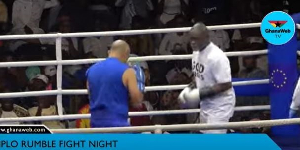Music of Sunday, 12 September 2004
Source: ghanamusic.com
Support Highlife To Live
Hiplife music, originated by Reggie Rockstone, has obviously caught on with the Ghanaian public especially the youth and threatens almost to wipe out the country?s indigenous hilife music.
Put two musicians on stage, one old one new, ask them to play the music of their era and you will see that the music of the new will catch on with the audience very much and lead them to wriggle their waists in response. The least said about the response to the old musician the better.
While individuals have expressed concern about the introduction of rap on to the local music scene, others are only worried about the lyrics in the rap songs. Abirekyreba Kofi Sammy, an old musician falls into the category of people who are concerned about the lyrics.
In an interview with Showbiz, Kofi Sammy, of Okukuseku fame (real name Kofi Amese) noted that most of the hiplife songs promote promiscuity and violence and can be partly blamed for the moral decadence that is currently being experienced in the country.
?Today it is Asiee ho, tomorrow it is Pan Pan, Pan, the next day it is ?Ye?nko da? and so on and so forth. These hiplife songs have lowered moral standards and are a drawback to the fight against AIDS,? he said.
He wondered why some of these profane songs are enjoying airplay even on national radio and said radio presenters had a duty to ensure that songs played on their programmes were devoid of lyrics which could lower moral standards.
?In our days, we sang songs which educated, informed and entertained but these days things have changed. Even in our days although there were no profane songs, presenters on the existing radio stations played the songs over and over again to listen to the lyrics before going on air.?
Abirekyireba Kofi Sammy also criticized the dressing of the hiplife stars saying, saying it portrayed foreign culture. ?They should learn from people like Dr. K. Gyasi who put on rich Kente and Adinkra cloths when appearing on stage to play their Ahoma Nsiah.
Hiplife is killing cultural tourism. Most tourists come here to listen to the indigenous hilife music they have heard so much about and which is part of our culture but cannot find it,? he stressed.
Turning the spotlight on traditional hilife music, Kofi Sammy was of the view that if it is promoted it will take its place again as the preferred music of Ghanaians and topple hiplife to second or third place. ?Unfortunately nobody is ready to promote it. Most of the radio presenters whose duty it is to promote indigenous music are the producers of these hiplife artistes so they are not interested in promoting our music.?
?MUSIGA is not doing anything to promote, preserve and protect hilife music. It should do something. The hiplife which is being promoted does not go far. It is sold only in ?koobi?, yam, and plantain stores in Europe whereas our music of old was very well known all over the world.?
According to him, he is collaborating with Rockia Resource and Tours Ghana Ltd to put his old music on CD for sale. The project which he said would take off next year was to set standards in the music industry for others to follow and urged other old musicians to avail themselves for the programme. ?We are doing this to preserve hilife music just like the Congolese, Senegalese and Malians have preserved their music?.
He called on the government to support old musicians to ?bring back the glories of hilife music,? by offering them financial assistance to go round the country to sensitise the people on the need to preserve hilife adding that the preservation of hilife will aid the country in its bid to increase cultural tourism.
Abibrekyireba Kofi Sammy, 58, started his musical career at the age of 15 with the Albella Band in Kumasi. He also played with Boakye?s band between 1959-1961, E.K?s band in 1966, the Jaguar Joker?s 1961-1962, K. Gyasi?s band, 1962-1964, Ahamanos 19651967, K. Gyasi?s band again from 1967-1969 and formed the Okukuseku Number Two band in 1970. He toured Nigeria in 1977 and later released the hit song ?Yellow Sisi? which sold millions of copies in Nigeria and other parts of the world.










